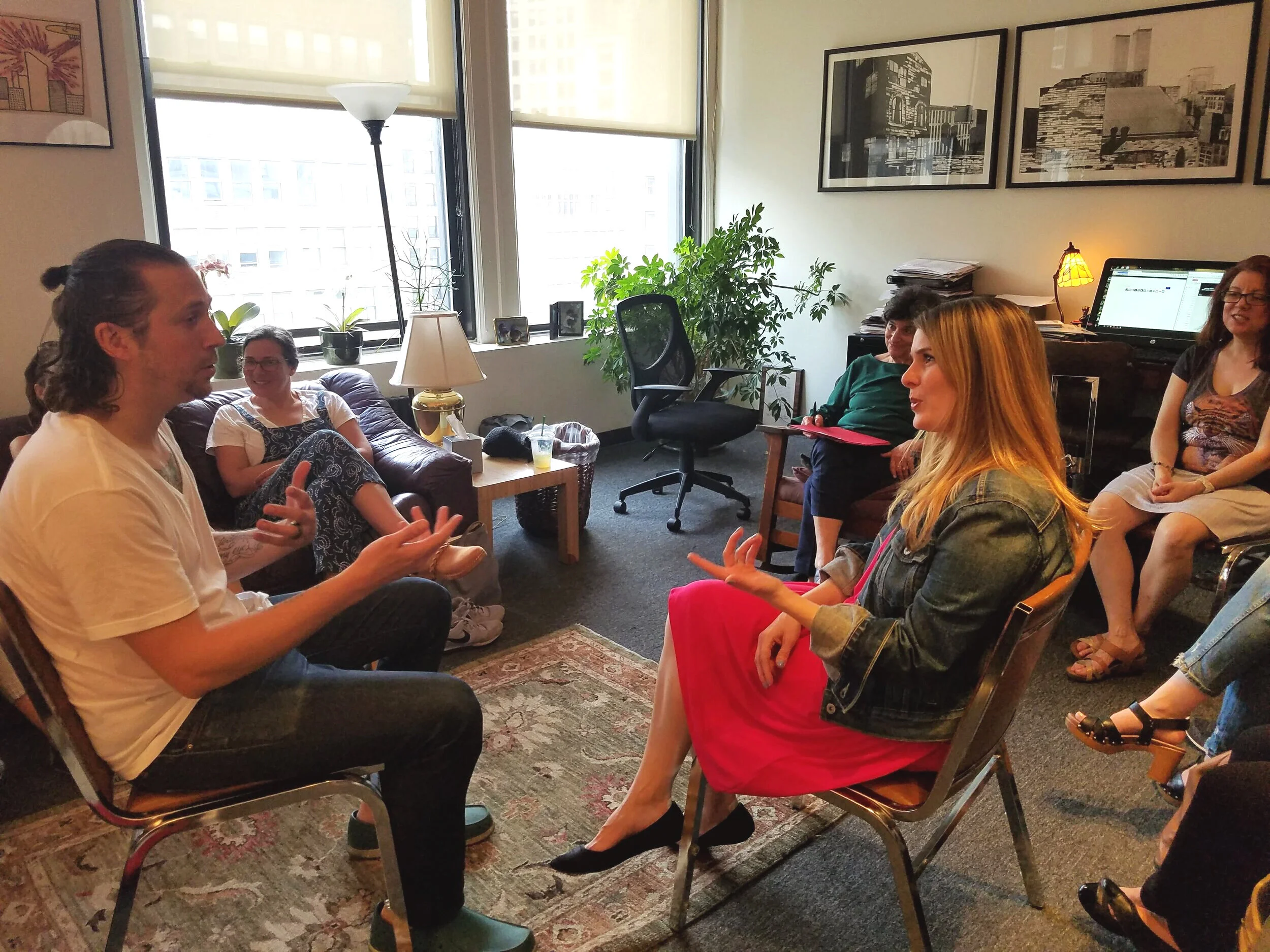Introductory Program
We are offering a hybrid training option, for those who cannot attend classes in person. We will be conducting on-site Friday evening classes for all who are able to attend.
Anyone with an interest in Gestalt therapy may apply to our 1-year program. Those clinicians who already have an active practice but want to add to their knowledge and skills will find our program challenging and exciting. Also, people from allied fields such as business consulting, coaching, public relations, body work and others can add to their professional skill set in our Introductory Program. To apply, complete an application form and send additional requested materials. Once received, we will contact you to arrange a personal interview.
**LMSWs and LCSWs earn 20-30 NYS-Approved CEU contact hours per academic year, for all courses in the Introductory Program.
**LMHCs, LCATs, and LMFTs earn 20-30 20-30 NYS-Approved contact hours per academic year, for Lifebridge and Weekend Workshops.
The “Core” Curriculum
The Core Curriculum is an integral part of each level of training.
Experiential work—including practicum, faculty demonstrations, intensive weekend workshops, and personal therapy–forms the core of our training curriculum.
Practicum: Practicum sessions provide trainees with the opportunity to work as patient or therapist, under the moment-to-moment supervision of a faculty member. During this 2-hour class, students are broken up into small groups and work with each other in patient/therapist dyads, under the observation of a supervisor. The supervisor will intervene as needed, to offer suggestions or to respond to a question posed by the student who is working as therapist. After the completion of each session, issues of transference/countertransference, resistance, diagnosis, and developmental and other psychodynamic issues are analyzed and related to Gestalt theory and to the preceding lecture class. Faculty members for practicum vary from week to week.
Demonstrations by Faculty: Every 4th practicum class, a Faculty member will do a live therapy demonstration with a trainee, in front of small group, providing the opportunity to observe and discuss the application of Gestalt theory to Gestalt therapy practice. Faculty member demonstrations vary, to allow exposure to as many Faculty as possible.
Clinical Experience: Trainees in the Practitioner Program do not see clients in our low-fee clinic.
Weekend Workshops: Workshops led by Faculty are offered once each year, and provide an intensive training experience in which advanced concepts in Gestalt therapy are explored.
Individual and Group Therapy: Each trainee’s personal therapy experience provides a first-hand experience of Gestalt therapy and a forum for working through issues that may emerge in the therapist/client relationship.
The “Core” Curriculum
The Core Curriculum is an integral part of each level of training.
Experiential work—including practicum, faculty demonstrations, intensive weekend workshops, and personal therapy–forms the core of our training curriculum.
Practicum: Practicum sessions provide trainees with the opportunity to work as patient or therapist, under the moment-to-moment supervision of a faculty member. During this 2-hour class, students are broken up into small groups and work with each other in patient/therapist dyads, under the observation of a supervisor. The supervisor will intervene as needed, to offer suggestions or to respond to a question posed by the student who is working as therapist. After the completion of each session, issues of transference/countertransference, resistance, diagnosis, and developmental and other psychodynamic issues are analyzed and related to Gestalt theory and to the preceding lecture class. Faculty members for practicum vary from week to week.
Demonstrations by Faculty: Every 4th practicum class, a Faculty member will do a live therapy demonstration with a trainee, in front of small group, providing the opportunity to observe and discuss the application of Gestalt theory to Gestalt therapy practice. Faculty members for demonstration vary from week to week. .
Clinical Experience: Beginning in Level II, trainees will work with clients in our onsite clinic, providing the opportunity for hands-on learning.
Weekend Workshops: Workshops led by Faculty are offered once each year, and provide an intensive training experience in which advanced concepts in Gestalt therapy are explored.
Intensive Training Retreat: In this 4-day intensive workshop, trainees work in practicum/therapists dyads, in both small and large groups, under the observation of a supervisor. As trainees observe each other’s work, in a collegial and supportive atmosphere, the unique individual style of each training therapist is defined and supported. The Intensive Training Retreat is optional for the Practitioner Program.
Individual and Group Therapy: Each trainee’s personal therapy experience provides a first-hand experience of Gestalt therapy and a forum for working through issues that may emerge in the therapist/client relationship.
Level I Coursework
SEMINAR 101: ELEMENTS OF THERAPEUTIC COMMUNICATION AND PROCESS
This course explores the basic structures of interpersonal communication, with an emphasis on the role of how body and language cues, and intuitive information, may alter and/or enhance overt communication and reveal unaware messages and processes.
SEMINAR 102: INTRODUCTION TO INTAKE ASSESSMENT, PSYCHOPATHOLOGY AND DIAGNOSIS
This course provides an overview of the intake process and utilizes the Diagnostic and Statistical Manual as a guide for appropriate diagnosis. With the instructor’s supervision, participants conduct actual clinic intake interviews, and submit written case presentations.
SEMINAR 103: DEVELOPMENTAL THEORY & BASIC INTERVENTION STRATEGIES
This seminar focuses on developmental theory and its practical application to Gestalt Therapy. We will explore techniques, approaches, and interventions designed to engage and systematically develop a client’s presenting issues with the goal of revealing underlying emotional concepts.
CORE CURRICULUM
Tuition: $3500 per year / no materials fee.
We offer a limited number of partial scholarships, with the goal of promoting diversity both in our training program, and in the larger profession of psychotherapy.

